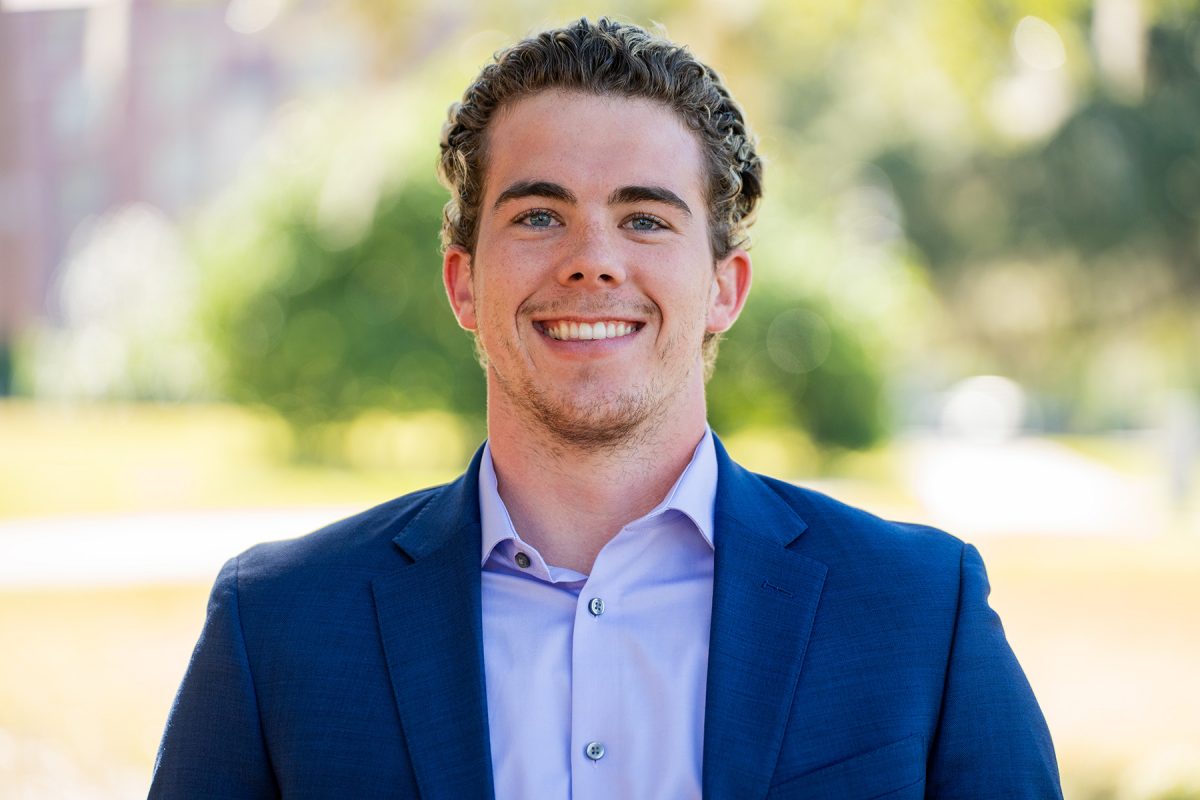
“I remember having a gut feeling that this was where I was supposed to end up for my college education, and I was right.”
Fast Facts
- Farmer: His dad’s family owns a timber farm in South Carolina
- School Spirit: Stormed the field during the 2022 football game against University of Florida
- Lifeguard: Head lifeguard for Campus Recreation
- Hard Worker: Has three on-campus jobs
- Peacekeeper: Plans to join the Peace Corps after graduation
Robbie Rice is a motivated Florida State University student who is dedicated to helping others through his psychological research. During his time at FSU, Rice has been involved across campus with three on-campus jobs, including his position as head lifeguard for Campus Recreation.
Rice has been a research assistant at the Joiner Laboratory under leading suicidology researcher Thomas Joiner in the College of Arts and Sciences. Under Joiner, Rice conducted suicide risk assessments with participants and helped to develop safety plans for their moments of crisis. Rice also won an IDEA Grant as the primary investigator of an Honors in the Major psychology study. The study investigates how escapism relates to suicidal thoughts and ideation through a series of risk assessments and focus groups.
Why did you choose to attend Florida State University?
I chose Florida State University because of what it represented to me: independence. Before attending FSU, I had been to Tallahassee once to tour the campus. I remember having a gut feeling that this was where I was supposed to end up for my college education, and I was right. Since no one in my family had attended FSU, I felt that the lack of pressure as a non-legacy student would allow me to flourish in this environment and make it my own. Also, none of my family members live within two hours of Tallahassee and the distance contributed to a freedom that I wanted to prioritize for my college experience.
What has been the most rewarding academic opportunity you have had at Florida State University?
I was aware that FSU had one of the best psychology programs in the state. However, I was not aware that a leading suicidology researcher, Thomas Joiner, worked at FSU. I will forever be indebted to FSU for the experiences I have gained from my time spent working as a research assistant in the Joiner Laboratory. I find a sense of reward from conducting suicide risk assessments as a part of my responsibilities as a psychology research assistant for a graduate student’s psychology study within the Joiner Lab.
How have you used research opportunities to help your community?
At the Joiner Lab, I have conducted suicide risk assessments as a part of my responsibilities as a psychology research assistant. These risk assessments are for collecting data of the measures pertaining to suicide. The calls begin with a simple introduction to create rapport with the participant. We have access to their scores on certain measures beforehand. This dictates the direction that the call goes in. The purpose is to inquire about death and suicidal ideation, ascertain their suicide attempt history and then see where they fall on a 0-10 scale for suicidal desire and suicidal intent.
I find it rewarding when we discuss means of safety, in relation to their access to dangerous objects like pills and guns and create a safety plan for when they’re in crisis because the participants tend to say it is the most validating for them. No two calls are the same. Our role is to listen and empathize with the difficult situations they have gone through or are currently going through.
How did you navigate challenges that arose during your research?
As the primary investigator of an Honors in the Major psychology study, I adopted a realistic approach so that the project could succeed. My initial vision for the study was to create my own measure for a proxy to suicide and conduct multiple studies to test the validity of this measure, as well as lead focus groups to further conceptualize how escapism was related to suicidal ideation. After an overwhelming period, I remembered that I was an undergraduate student. I narrowed the scope of the study to something more in line with my commitments as a full-time student. I designed the study’s protocol – based off the literature review I conducted – with my research assistants’ (RAs) responsibilities as full-time students in mind. I created the inclusion criteria, so participants were not required to be actively suicidal to be eligible for the study. I clarified to the RAs and participants that the risk assessments could be held virtually to accommodate schedules.
Using my experience as a research assistant in the past and my understanding of its difficulties, I coordinated the distribution of research roles and instituted study procedures. I provided all RAs with an updated copy of the protocol for the first focus group in advance. I organized the participant-tracker Excel sheet, so it was understandable and easy to access. Before my study was approved, I established which RAs would be assisting with the analyses, who would work with me to create the flyers and when I would be requesting everyone’s availability.
988 Suicide & Crisis Lifeline
If you or someone you know is in emotional distress or a suicidal crisis, you can reach the 988 Suicide & Crisis Lifeline by calling or texting 988. You can also chat with the 988 Suicide & Crisis Lifeline here.
The National Alliance on Mental Illness HelpLine
For more information about mental health care resources and support, The NAMI HelpLine can be reached Monday through Friday, 10 a.m.–10 p.m. ET, at 1-800-950-NAMI (6264) or email at info@nami.org.



